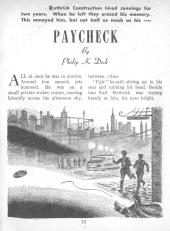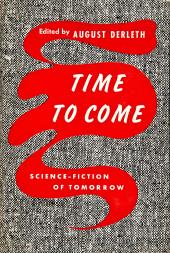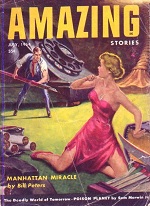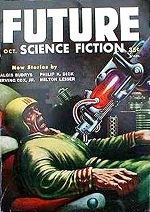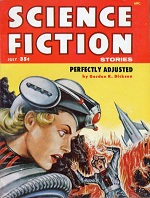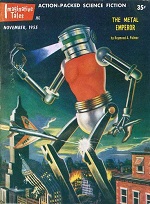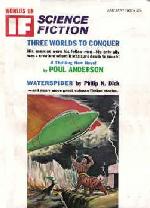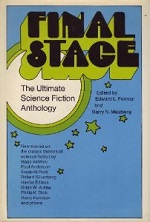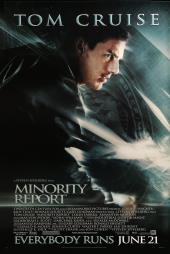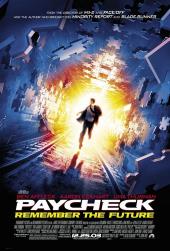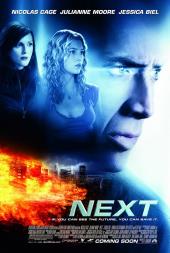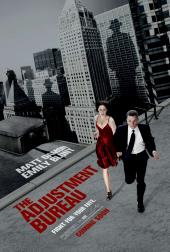Novelette
Philip K. Dick
writer
- Filter: Show all works, including those with no time phenomena.
- Found: 25 results in 2.31ms
Novella
Novelette
Paycheck
- by Philip K. Dick
- Imagination, June 1953
Apparently, Jennings agreed to work as a specialized mechanic for two years at Rethrick Construction, having his memory wiped at the end in return for 50,000 credits—except instead of a bag full of credits, the memory-wiped Jennings is left holding a bag of seven trinkets and no idea why he would have agreed to such a thing. —Michael Main
But the big puzzle: how had he—his earlier self—known that a piece of wire and a bus token would save his life? He had known, all right. Known in advance. But how? And the other five. Probably they were just as precious, or would be.

Short Story
Novelette
Jon’s World
- by Philip K. Dick
- in Time to Come: Science-Fiction Stories of Tomorrow, edited by August Derleth; Farrar (Strass and Young, April 1954)
First the Soviets and the Westerners fought. Then the Westerners brought Schonerman’s killer robots into the mix. Then the robots fought both human sides. You know all that from Dick’s earlier story, “Second Variety.” But now it’s long after the desolation, long enough that Caleb Ryan and his financial backer Kastner are willing to bring back the secret of Schonerman’s robots from the past to make their world a better place for surviving mankind, including Ryan’s visionary son Jon. —Michael Main
And then the
terminator’sclaws began to manufacture their own varieties and attack Soviets and Westerners alike. The only humans that survived were those at the UN base on Luna.
Short Story
Breakfast at Twilight
- by Philip K. Dick
- in Amazing, July 1954
Tim McLean’s ordinary family awakens on an ordinary day to find themselves in a war zone seven years in the future.
We fought in Korea. We fought in China. In Germany and Yugoslavia and Iran. It spread, farther and farther. Finally the bombs were falling here. It came like the plague. The war grew. It didn’t begin.

Short Story
Meddler
- by Philip K. Dick
- in Future Science Fiction, October 1954
A government project sends a Time Dip into the future just to observe whether their actions have turned out well, but subsequent observations show that the act the observing has somehow eliminated mankind, so Hasten (the world’s most competent histo-researcher) must now go forward to find out what caused the lethal factor.
We sent the Dip on ahead, at fifty year leaps. Nothing. Nothing each time. Cities, roads, buildings, but no human life. Everyone dead.

Short Story
Service Call
- by Philip K. Dick
- Science Fiction Stories, July 1955
It the midst of McCarthyism, Dick wrote this story about an accidental travel through time to the 1950s by a swibble repairman, whereupon Mr. Courtland and his colleagues pry information out of the repairman about exactly what a swibble is and how it has stopped all war.
—remember the swibble slogan: Why be half loyal?

Short Story
Psi-Man Heal My Child!
- by Philip K. Dick
- in Imaginative Tales, November 1955
In a post nuclear apocalypse world, a small group of Psionic people use their powers to help survivors while Jack repeatedly travels back in time to try to stop a general from taking a firm stand against the Russians.
Unfortunately, for me, the unexplained time-travel paradoxes in the ending lowered my enjoyment, even though it was no worse than the inexplicable paradoxes in so many other stories.
Unfortunately, for me, the unexplained time-travel paradoxes in the ending lowered my enjoyment, even though it was no worse than the inexplicable paradoxes in so many other stories.
Eleven times and always the same.

Novel
The World Jones Made
- by Philip K. Dick
- in Ace Double #D-150: The World Jones Made by Philip K. Dick / Agent of the Unknown by Margaret St. Clair 1956)
Short Story
Novel
Dr. Futurity
- by Philip K. Dick
- in Ace Double D-421, Dr. Futurity by Philip K. Dick / Slavers of Space[/em] by John Brunner (Ace Books, February 1960)
Novel
Martian Time-Slip
- by Philip K. Dick
- 3-part serial, Worlds of Tomorrow, August, October, and December 1963
Short Story
Waterspider
- by Philip K. Dick
- in If, January 1964
Aaron Tozzo and his colleague Gilly travel back to a 1950s science fiction convention (to them, a Pre-Cog Gathering) to ’nap Poul Anderson because they believe that sf writers have pre-cognition of their own time that can solve their current space travel problem. A cute story with descriptions of many writers of the time, but the ending takes that turn that I never like of Tozzo slowly losing his memory of the original world after they inadvertantly change something.
“Yes,” he said to Poul, “you do strike me as very, very faintly introve—no offense meant, sir, I mean, it’s legal to be introved.”

Novel
Short Story
Novel
Short Story
A Little Something for Us Tempunauts
- by Philip K. Dick
- in Final Stage, edited by Edward L. Ferman and Barry N. Malzberg (Charterhouse, May 1974)
Addison Doug and his two fellow time travelers seem to have caused a time loop wherein everyone is reliving the same events with only vague memories of what happened on the previous loop.
Every man has more to live for than every other man. I don’t have a cute chick to sleep with, but I’d like to see the semi’s rolling along the Riverside Freeway at sunset a few more times. It’s not what you have to live for; it’s that you want to live to see it, to be there—that’s what is so damn sad.

Short Story
Short Story
Feature Film
Minority Report
- by Scott Frank and Jon Cohen, directed by Steven Spielberg
- (premiered at an unknown movie theater, New York City, 17 June 2002)
Police use precognition (but no clear-cut time travel) to fight crime. —Michael Main
I have no idea! I’ve never heard of him! But I’m supposed to kill him in less than thirty-six hours.

Feature Film
Paycheck
- by Dean Georgaris, directed by John Woo
- (at movie theaters, USA, 25 December 2003)
Unlike Philip K. Dick’s story of the same name, the film has only viewing the future rather than physical time travel such as the story’s time scoop’s retrieval capability. Also, the film omits Dick’s dystopian police state and his theme of fate via what appears (in the story) to be a single static timeline. On the other side of the coin, the filmmakers made an epic car chase scene, took Jenning’s female sidekick off the sidelines, and attempted to massively raise the stakes via some questionable choices by Jennings. —Michael Main
Shorty: Look, if we know anything, we know that time travel's not possible. Einstein proved that. Right?
Michael: Time travel, yes. But Einstein was very clear that he believed time viewing, theoretically, could be accomplished.
Feature Film
Next
- by Gary Goldman, Jonathan Hensleigh, and Paul Bernbaum, directed by Lee Tamahori
- (at movie theaters, Belgium and France, 25 April 2007)
Cris Johnson is a precog—usually seeing two minutes ahead, except for that time he saw a woman in a diner at 8:09—but he’s not a time traveler. —Michael Main
No mega-jackpots, no long shots. The idea is to go unnoticed: That way I can keep coming back.

Feature Film
The Adjustment Bureau
- written and directed by George Nolfi
- (premiered at an unknown movie theater, New York City, 14 February 2011)
TV Episode
“Impossible Planet”
- by Philip K. Dick
- (Channel 4, UK, 24 September 2017)
A pair of spaceship pilots take advantage of centuries-old Irma Louise Gordon who just wants to see Earth before she dies.
Parts of Philip K. Dick’s original story are gone, such as the original ending, which must have been corny even in 1953; and part of the ambiguous revised plotline can be interpreted as time travel, although I suspect that adapter/director David Farr had a different meaning in mind. Regardless, I found Farr’s characters moving.
Parts of Philip K. Dick’s original story are gone, such as the original ending, which must have been corny even in 1953; and part of the ambiguous revised plotline can be interpreted as time travel, although I suspect that adapter/director David Farr had a different meaning in mind. Regardless, I found Farr’s characters moving.

